Daily Vocabulary Words: List of Daily Used Words in Leading Indian Newspapers
Hi there. Welcome to this special section @ Wordpandit. Our endeavour here is straightforward: highlighting daily vocabulary words that you would come across in leading newspapers in the country. We have included the following newspapers in our selection:
• The Times of India
• The Economic Times
• Hindustan Times
• Mint
• Indian Express
We are putting in extensive work to develop your vocabulary. All you have to do is be regular with this section and check out this post daily. This is your repository of commonly used words; essentially, we are posting a list of daily used words. Hence, this has significant practical application as it teaches you words that are commonly used in leading publications mentioned above.
Visit the website daily to learn words from leading Indian newspapers.
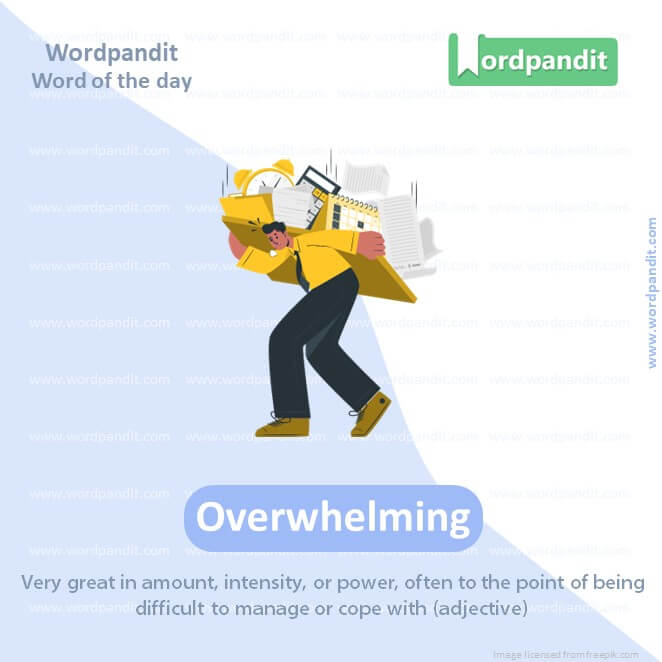
WORD-1: Overwhelming
CONTEXT: Sexual harassment cases are hard to pursue everywhere precisely because many investigation and justice systems see everything from the point of view of the accused, whose social or financial power is overwhelming.
SOURCE: Times of India
EXPLANATORY PARAGRAPH: Imagine you have so many toys to play with that you don’t know which one to choose. That feeling when something is too much or too strong, like a really loud noise or a big crowd of people, is called overwhelming.
MEANING: Very great in amount, intensity, or power, often to the point of being difficult to manage or cope with (adjective).
PRONUNCIATION: oh-ver-WHEL-ming
SYNONYMS: Intense, Overpowering, Unbearable, Staggering, Excessive.
USAGE EXAMPLE:
1. The support from everyone was overwhelming.
2. She felt an overwhelming sense of joy.
3. The task seemed overwhelming at first.
4. The evidence against him was overwhelming.
WORD-2: Fantastical
CONTEXT: Their fears were based on the fantastical notion that AGI is imminent and could prove to be an existential threat.
SOURCE: Indian Express
EXPLANATORY PARAGRAPH: Think of a story with dragons, fairies, and magic lands. Fantastical means something is like a fantasy, not real, but very imaginative and exciting, like a fairy tale.
MEANING: Imaginative and unrealistic, resembling fantasy (adjective).
PRONUNCIATION: fan-TAS-ti-kul
SYNONYMS: Imaginary, Unbelievable, Unreal, Whimsical, Mythical.
USAGE EXAMPLE:
1. The movie had fantastical creatures in it.
2. Her ideas were often too fantastical to be true.
3. The book was filled with fantastical adventures.
4. The costume was whimsical and fantastical.
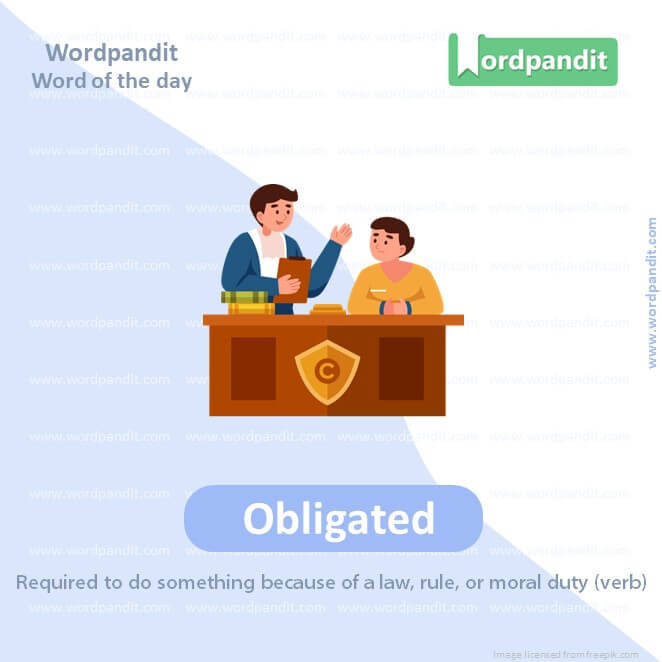
WORD-3: Obligated
CONTEXT: Are business owners morally obligated to provide customers fair access to essential items in times of crises and a resultant desperate need or seize the opportunity to hike prices?
SOURCE: Hindustan Times
EXPLANATORY PARAGRAPH: When you have to do something because it’s a rule, like washing your hands before dinner, that’s being obligated. It means you feel like you must do something because it’s expected or required.
MEANING: Required to do something because of a law, rule, or moral duty (verb).
PRONUNCIATION: OB-li-gay-ted
SYNONYMS: Required, Compelled, Bound, Constrained, Duty-bound.
USAGE EXAMPLE:
1. She felt obligated to finish the project.
2. He was legally obligated to pay the fine.
3. We are obligated to follow the rules.
4. The contract obligated him to complete the work.
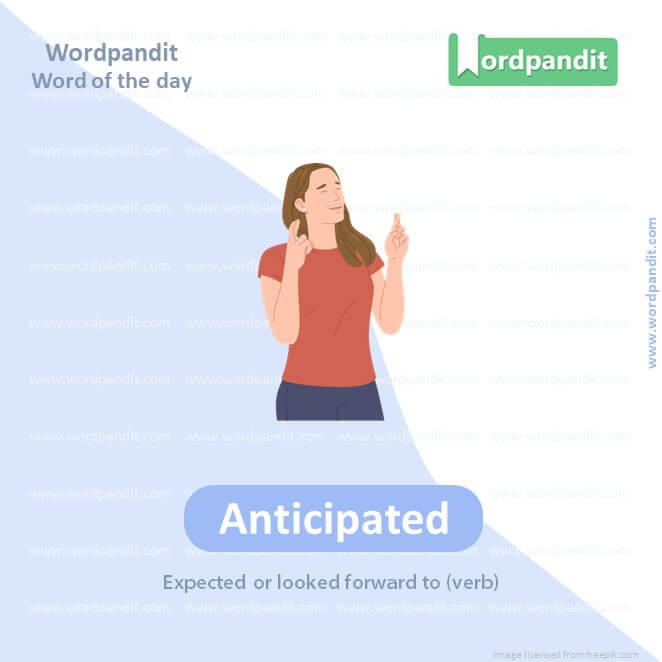
WORD-4: Anticipated
CONTEXT: There was no major economic accident and the world performed better in 2023 than what was anticipated.
SOURCE: Times of India
EXPLANATORY PARAGRAPH: Imagine you can’t wait for your birthday because you’re excited about the gifts. Anticipated means looking forward to something or expecting it to happen, like waiting eagerly for a special day.
MEANING: Expected or looked forward to (verb).
PRONUNCIATION: an-TIS-i-pay-ted
SYNONYMS: Expected, Awaited, Predicted, Foreseen, Hoped-for.
USAGE EXAMPLE:
1. The concert was eagerly anticipated.
2. She anticipated the problems that might arise.
3. The anticipated release of the movie created much excitement.
4. His return was much anticipated.
WORD-5: Imminent
CONTEXT: Their fears were based on the fantastical notion that AGI is imminent and could prove to be an existential threat.
SOURCE: Indian Express
EXPLANATORY PARAGRAPH: If you see dark clouds, you know it’s going to rain soon. Imminent is like that. It means something is about to happen very soon, like rain coming when there are dark clouds.
MEANING: About to happen; likely to occur in the very near future (adjective).
PRONUNCIATION: IM-i-nent
SYNONYMS: Approaching, Near, Coming, Forthcoming, Impending.
USAGE EXAMPLE:
1. The scientists warned of the imminent earthquake.
2. Everyone was aware of the imminent danger.
3. Her departure was imminent.
4. The threat of rain was imminent.
WORD-6: Corollary
CONTEXT: This ethics versus opportunity is a vexed debate often resting in favour of “opportunity” as the logical corollary of a market-driven economy.
SOURCE: Hindustan Times
EXPLANATORY PARAGRAPH: Think about when you clean up your room and find lost toys. Finding toys is a result of cleaning. A corollary is like that; it’s something that naturally follows or results from something else.
MEANING: A consequence or result that naturally follows or is logically connected (noun).
PRONUNCIATION: KOR-uh-lair-ee
SYNONYMS: Consequence, Result, Outcome, Offshoot, Inference.
USAGE EXAMPLE:
1. The corollary of increased technology use is decreased privacy.
2. His success is a corollary of his hard work.
3. The economic boom had several positive corollaries.
4. The decline in pollution is a corollary of the new regulations.
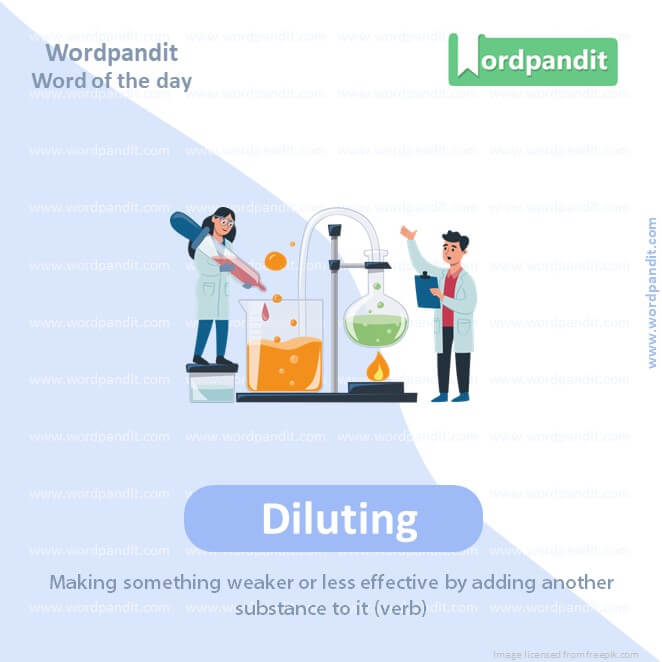
WORD-7: Diluting
CONTEXT: What the letter ignored was the political economy around AI — the question of data hunger of AI which has implications on both diluting privacy and on labour conditions of platform workers.
SOURCE: Indian Express
EXPLANATORY PARAGRAPH: Imagine putting a lot of water in a little bit of orange juice. The juice won’t taste strong anymore. Diluting is when you make something weaker or less effective by mixing it with something else, like water in juice.
MEANING: Making something weaker or less effective by adding another substance to it (verb).
PRONUNCIATION: dy-LOOT-ing
SYNONYMS: Watering down, Thinning, Weakening, Attenuating, Lessening.
USAGE EXAMPLE:
1. He was diluting the paint with water.
2. The company’s decision was seen as diluting its original mission.
3. Diluting the syrup makes it less sweet.
4. The new shareholders ended up diluting the founder’s control.
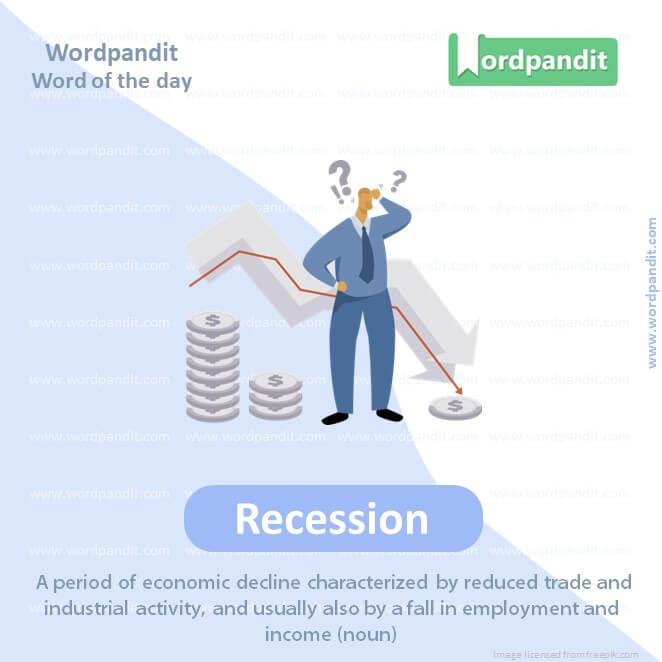
WORD-8: Recession
CONTEXT: The world’s largest economy, America, avoided a recession and is projected to grow a robust 2.5% in 2023. China, the second-largest economy, saw its GDP rebound as Covid curbs were lifted and the government provided huge support.
SOURCE: Times of India
EXPLANATORY PARAGRAPH: Think of a time when people have less money to buy toys and things. A recession is like that. It’s a time when there is less business activity, and people might not have as many jobs or as much money.
MEANING: A period of economic decline characterized by reduced trade and industrial activity, and usually also by a fall in employment and income (noun).
PRONUNCIATION: re-SESH-un
SYNONYMS: Downturn, Slump, Economic decline, Slowdown, Contraction.
USAGE EXAMPLE:
1. The country is going through a severe recession.
2. The recession led to high unemployment rates.
3. Many businesses closed during the recession.
4. Economists are predicting a global recession.
WORD-9: Mystical
CONTEXT: The concrete harms of AI systems, which are becoming ubiquitous, were ignored in favour of an industry-centric worldview in which the “danger of AI” was in a mystical future variant of the technology.
SOURCE: Indian Express
EXPLANATORY PARAGRAPH: Think about a story with magical powers and hidden meanings, like a wizard who can talk to animals. Mystical is something that is spiritual or mysterious, not easily explained, like magic.
MEANING: Relating to mysteries, the supernatural, or spiritual aspects that are difficult to understand (adjective).
PRONUNCIATION: MIS-ti-kul
SYNONYMS: Magical, Spiritual, Supernatural, Enigmatic, Esoteric.
USAGE EXAMPLE:
1. The forest had a mystical charm.
2. She was interested in mystical experiences.
3. The book explores various mystical traditions.
4. There was a mystical quality to his music.
WORD-10: Stochasticity
CONTEXT: It ignored AI’s stochastic and opaque workings which have impacts on democratic processes when AI systems are used in public-use cases like surveillance and policing (where stochasticity and arbitrariness shouldn’t be tolerated) as well as ignoring the propensity of AI systems in replicating and strengthening structural problems.
SOURCE: Indian Express
EXPLANATORY PARAGRAPH: Imagine if you didn’t know what you were going to get for lunch – it could be pizza, or it could be a sandwich. It’s a surprise! Stochasticity is like that. It’s when things happen by chance or randomly, and you can’t predict exactly what will happen.
MEANING: The quality of being random or involving chance (noun).
PRONUNCIATION: sto-kas-TIS-i-tee
SYNONYMS: Randomness, Unpredictability, Chance, Variability, Uncertainty.
USAGE EXAMPLE:
1. Stochasticity plays a role in genetic variation.
2. The model incorporates stochasticity to reflect real-world conditions.
3. Financial markets often exhibit stochasticity.
4. The researcher studied the stochasticity of molecular interactions.
Vocabulary new Words
In the exuberant realm of language learning, nothing holds more thrill than the discovery of ‘vocabulary new words’. These gems of knowledge bring with them a fresh perspective and a deeper understanding of language. However, learning ‘vocabulary new words’ requires a methodical and focused approach.
The act of learning ‘vocabulary new words’ is a delve into linguistic novelty, often involving exposure to unfamiliar structures and meanings. Transcending the traditional approach of mere memorization helps in truly cementing newly learnt words into long-term memory. Interaction with a broad spectrum of written and spoken material, including novels, films, podcasts, and digital resources, provides a rich context of ‘vocabulary new words’ and significantly aids in their comprehension.
It’s noteworthy that unpacking ‘vocabulary new words’ is a steady process rather than a rushed one. A planned approach with a specific number of words, learned and reviewed each day, proves beneficial in effective learning. Coupling this method with technologies such as flashcards or memory-enhancement software can optimize the retention of ‘vocabulary new words’.
Integrating mnemonic devices and visual imagery is another highly efficient tool when learning ‘vocabulary new words’. Assigning unique stories or visuals to new words can enhance recall, making unfamiliar vocabulary much more approachable.
Lastly, practicing ‘vocabulary new words’ within daily routine is crucial for grasping their usage. Whether it’s through active utilization in conversation or incorporating these words in written communicative situations, application reinforces understanding.
In summation, mastering ‘vocabulary new words’ is an enriching pursuit that expands our linguistic horizons. However, a balanced approach, combining diverse reading materials, pacing your learning, employing memory-boosting strategies, and daily practice greatly streamlines the task. Embark on this fascinating journey, and let the ‘vocabulary new words’ fill your linguistic canvas with a fresh palette of expressions.













